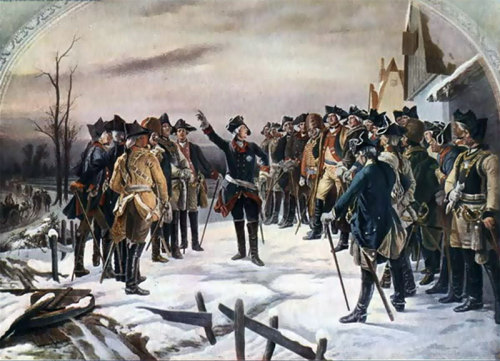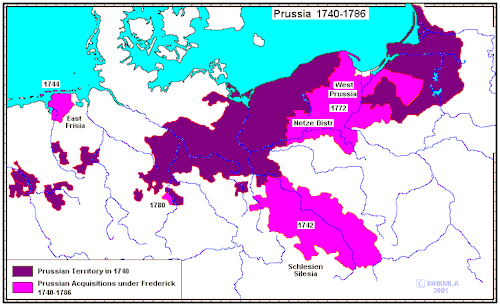Why Frederick was Great,“A crown is merely a hat to let the rain in”.-Frederick the Grea
Why Frederick was Great,“A crown is merely a hat to let the rain in”.-Frederick the GreatBorn Frederick II, Frederick seemed like the last person in the world to lead a conquering military. In fact, in his younger years he seemed more interested in fine arts and music than war and combat. He even once tried to run away to avoid becoming King of Prussia. However, when Frederick took the Prussian throne in 1740, his reign would stun Europe and rightly earn him the title, “Frederick the Great”.When Frederick came to power in 1740, Prussia was far from an empire, in fact it was a minor backwater in Eastern Germany and Western Poland. Some of its territory wasn’t even contiguous with the rest of the country (see map above) as small plots of Prussian soil doted Germany. Frederick sought to change all that.While Frederick’s kingdom was nothing special, his army certainly was. Prussia could not recruit mass armies like large empires such as Britain, France, or Russia. The population of eligible conscripts in Prussia was small, so the Prussians built an army based on quality rather than quantity. While small the Prussian Army was the best trained, most disciplined, best equipped, and most technologically advanced army in the world at the time. More importantly the Prussian Army was led by some of the best military commanders and tacticians in Europe. In most of Europe placement as a military officer was based on wealth and inherited privilege. This resulted in massive and unwieldy armies led by incompetent buffoons. In contrast the Prussian Army chose its leaders based on merit, skill, and ability. As a result the Prussian Army was led by a skilled officer corps, and commanded by brilliant generals who utilized audacious and revolutionary tactics.In 1741 Frederick tricked Austrian Queen Maria Theresa to allow his armies to occupy Lower Silesia (now the Czech Republic) in exchange for protection from France, Spain and Bavaria. He then proceeded to invade key areas, forcing Maria Theresa to cede almost all of Silesia by 1745. The annexation of Silesia almost doubled his kingdom overnight, while more importantly enriching his kingdom as Silesia was an important mining and industrial region of Eastern Europe. However, Maria Theresa was not going to simply let Prussia keep Silesia.In 1756, Austria would seek to take back Silesia, invading the territory as a part of the larger Seven Years War (known as the French and Indian War in America). However, Austria was not alone. Allied with her was France, Russia, Sweden, Saxony, and other German states. With enemies all around him it seemed that Frederick would be easily overrun. In fact Prussia almost collapsed as result, but the superior Prussian Army was able to hold out against impossible odds. Incredibly, under the direct leadership of the Frederick and the use of swift maneuvering the Prussian Army was able to prevent the major armies of France, Sweden, and Austria from linking. Unlike other monarchs, Frederick personally led his troops into battle. In fact he had six horses shot out from under him during the Seven Years War. One of his most famous tactics was the use of the “oblique order”, a strategy that involved attack a single flank on the enemy’s line. If that flank gave, the whole army, no matter how large, would be sent running.After a series of decisive victories, Frederick was able to fend off the Austrian Coalition and her allies. When the dust settled Prussia had nearly doubled in size. The Prussian victory shocked Europe. A small unimportant German Empire had single handidly defeat the major empires of Europe simultaneously. Frederick’s victory secured him and his military as the best of the best.Along with military success and conquest, Frederick sought to modernize his kingdom. He encouraged the development of new industry and new technologies, instituted important legal reforms, made Prussia’s education system the best in Europe, and instituted religious freedom.Frederick the Great died in 1786 at the age of 74. He left an incredible legacy in Europe and around the world, especially in military history. In the end his reputation was that of a brilliant military leader and conqueror. Even the great Napoleon Bonaparte looked up to Frederick the Great as the greatest tactician of all time. More importantly Prussia would form a foundation for a modern German state, as Prussia would be key to German Unification in the mid 19th century. The Prussian Army would hand down a legacy of military tradition and professionalism that would dominate Germany, lasting even until the end of World War II. Indeed Frederick was very great. -- source link
Tumblr Blog : peashooter85.tumblr.com
#history#prussia#prussian army#silesian wars#silesia#conquest#frederick ii#war#battle


